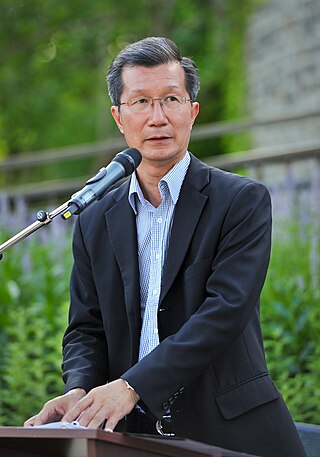Related Research Articles

The Canadian Security Intelligence Service is Canada's primary national intelligence agency. It is responsible for collecting, analysing, reporting and disseminating intelligence on threats to Canada's national security, and conducting operations, covert and overt, within Canada and abroad. The agency also reports to and advises the minister of public safety on national security issues and situations that threaten the security of the nation.

Yelena Georgiyevna Bonner was a human rights activist in the former Soviet Union and wife of the physicist Andrei Sakharov. During her decades as a dissident, Bonner was noted for her characteristic blunt honesty and courage.
The Security Intelligence Review Committee was a committee of Privy Councillors that was empowered to serve as an independent oversight and review body for the operations of the Canadian Security Intelligence Service (CSIS). The SIRC was established in 1984 as a result of the reorganization of Canadian intelligence agencies recommended by the McDonald Commission investigating the illegal activities of the former RCMP Security Service.
In Canada, a security certificate is a legal mechanism by which the Canadian government can detain and deport permanent residents and all other non-citizens living in Canada.
James Judd is a Canadian retired diplomat and senior civil servant. He served as the Director of the Canadian Security Intelligence Service (CSIS). He was appointed to the position by Liberal Prime Minister Paul Martin on November 29, 2004 and retired from the position on June 27, 2009, before the end of his term. He was succeeded by Richard Fadden, the former Deputy Minister of Citizenship and Immigration Canada.

Mohamed Harkat is a native-born Algerian and permanent resident of Canada who was arrested in 2002 on suspicion of ties to terrorism and was imprisoned under security certificates. The Canadian Security Intelligence Service (CSIS) alleged that he entered the country as a sleeper agent for al-Qaeda.
Mahmoud Es-Sayyid Jaballah is an Egyptian who has been detained in Canada without charge on a "security certificate" since August 2001 due to his association with members of al-Jihad. He has consistently asserted that he does not believe in violence, and just because he phones or visits people, does not mean that he shares their beliefs.
Yelena Nikolayevna Grosheva is a Russian former competitive gymnast. She won silver in the team event at the 1996 Summer Olympics and two team medals at the World Championships.
Jack Hooper is the former deputy director of the Canadian Security Intelligence Service (CSIS) who became well known mainly for his role in some of Canada's most sensitive and controversial spy-service scandals, including CSIS's involvement in the case of Maher Arar, a Canadian engineer father of two who was sent to Syria where he was imprisoned without charges and tortured.
Mohammed Zeki Mahjoub is an Egyptian national who was arrested in May 2000 on a security certificate for his alleged membership in the Vanguards of Conquest.

Kwok Chi (Michael) Chan is a politician in Ontario, Canada. He was a Liberal member of the Legislative Assembly of Ontario from 2007 until 2018. He represented the riding of Markham-Unionville. Chan served as a Cabinet Minister, during his entire tenure in politics in the governments of Dalton McGuinty and Kathleen Wynne. Michael Chan presently serves as a Senior Business Advisor for the law firm Miller Thomson LLP in Vaughan. Chan also serves as a member of the board of governors at the Seneca College of Applied Arts and Technology.
Richard Brian Marcel Fadden is a Canadian former civil servant who was the national security advisor to the prime minister of Canada and an associate secretary to the cabinet. He retired from that position on March 31, 2016. He had previously served as the deputy minister for the Department of National Defence from 2013 to 2015. From 2009 to 2013, he was the director of the Canadian Security Intelligence Service (CSIS). He was previously the deputy minister for Citizenship and Immigration Canada from 2006 to 2009.
The Illegals Program was a network of Russian sleeper agents under unofficial cover. An investigation by the Federal Bureau of Investigation (FBI) culminated in the arrest of ten agents on June 27, 2010, and a prisoner exchange between Russia and the United States on July 9, 2010.
Olshansky or Olshanski are East Slavic toponymic surnames associated with the places Olshana, Olshanka, Olshany, Halshany. The Belrusian-language rendering of the surname are Halshansky, Alshansky, Polish: Olszański, Holszański, Lithuanian: Olšanski, Alšėniškis. Feminine variants: Olshanska, Olshanskaya, Hoshanska, Halshanskaya. Notable people with the surname include:
Jeffrey Paul Delisle is a former Sub-Lieutenant in the Royal Canadian Navy who passed sensitive information from the top-secret STONEGHOST intelligence sharing network to the Russian spy agency GRU. Delisle's actions have been described as "exceptionally grave" by Canada's Department of National Defence (DND) and "severe and irreparable" by the Canadian Security Intelligence Service.

Yelena Borisovna Mizulina is a Russian politician and lawyer. She served as a member of the State Duma between 1995 and 2003 and again between 2007 and 2015, and has been a member of the Federation Council since 2015.

Andrey Bezrukov, often referred to by his cover name Donald Heathfield, is former KGB sleeper agent. He had served as both a KGB and SVR operative until his disclosure in the United States in 2010. His wife, Elena Stanislavovna Vavilova, often referred to by her cover name Tracey Foley, is also a former KGB sleeper agent.
Sexpionage is the involvement of sexual activity, or the possibility of sexual activity, intimacy, romance, or seduction to conduct espionage. Sex or the possibility of sex can function as a distraction, incentive, cover story, or unintended part of any intelligence operation.
Nadezhda (Esther) Markovna Ulanovskaya (1903—1986), AKA Nadia or Nadya, was a Soviet intelligence GRU officer, translator, English teacher, wife of Alexander Ulanovsky, and mother of Maya Ulanovskaya.
References
- 1 2 3 4 5 6 7 8 "Ex-Spy Refused Return to Canada". Moscow Times. 4 August 2006. Retrieved 22 December 2018.
- 1 2 3 4 Jiménez, Marina (4 October 2006). "Russian spy sues Ottawa for being left out in cold". The Globe & Mail. Retrieved 22 December 2018.
- 1 2 3 4 5 6 7 8 Jiménez, Marina (22 December 2006). "Ex-spy loses lawsuit over Canada's refusal to let her return". The Globe & Mail. Retrieved 22 December 2018.
- 1 2 3 4 5 6 Whitaker, Reginald; Kealey, Gregory S.; Parnaby, Andrew (2012). Secret Service: Political Policing in Canada : from the Fenians to Fortress America. University of Toronto Press. pp. 420–422. Retrieved 22 December 2018.